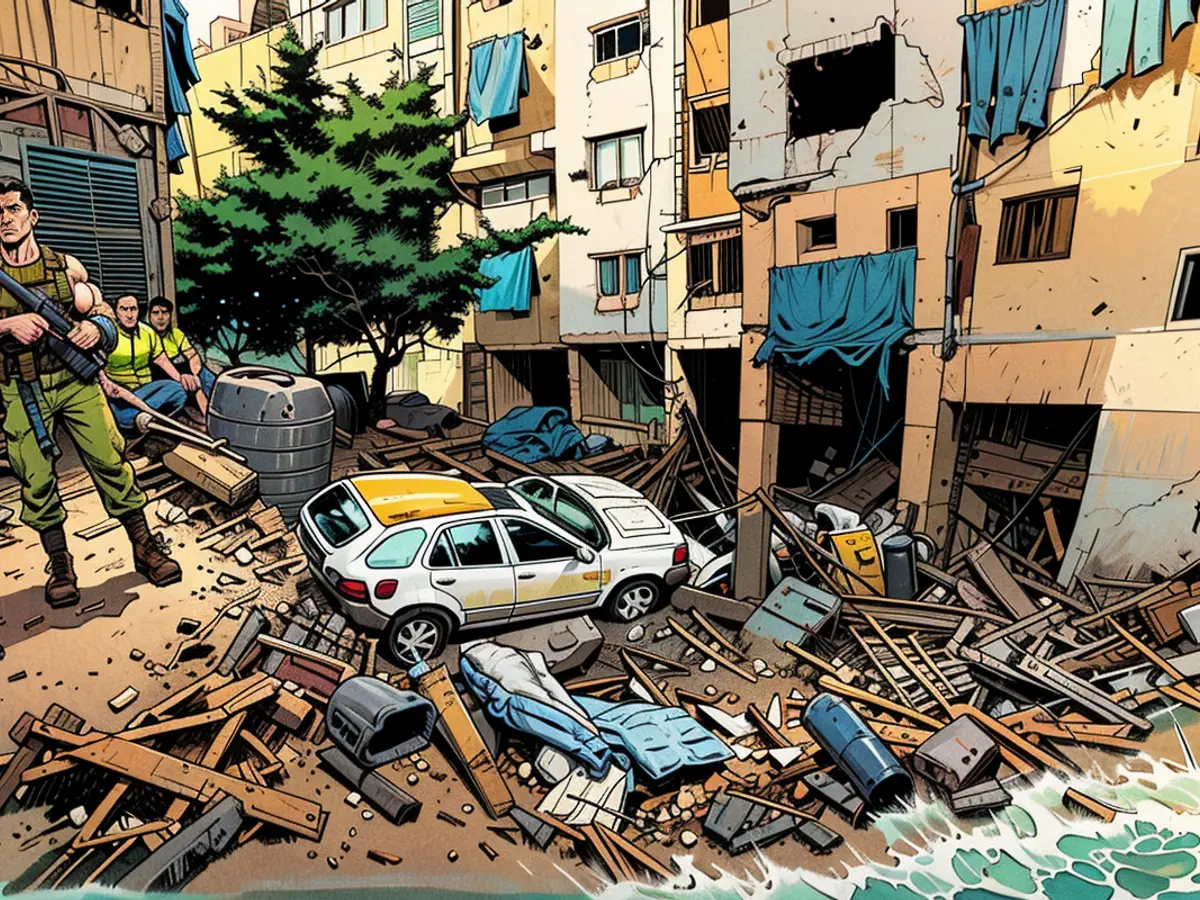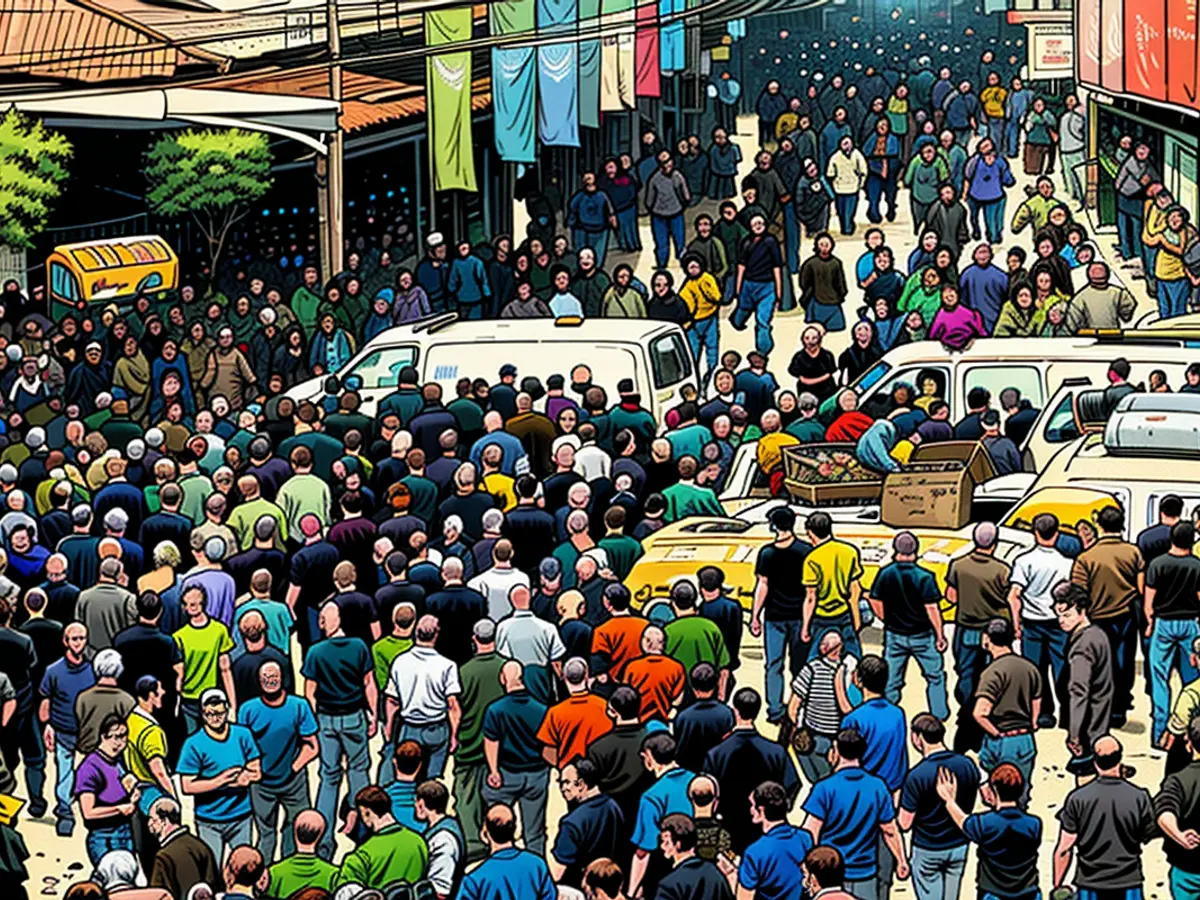Lebanon endures its deadliest day in nearly twenty years due to Israeli attacks. Let's delve into the available information.
Fear and devastation gripped Lebanon's citizens as Israeli missiles claimed at least 492 lives, including numerous children, and left over 1,600 individuals injured, as reported by authorities. Israel's Prime Minister, Benjamin Netanyahu, declared that their military strikes on Monday obliterated 1,600 Hezbollah assets within Lebanon, hinting at a possible ground invasion.
Several nations voiced concern about the rising risk of a larger-scale regional conflict and urged global pressure to alleviate tensions. Surprisingly, neither Israel nor Hezbollah has referred to the current escalation as a war.
Here's a summary of recent events:
What transpired?
On this fateful Monday, Israel mercilessly escalated its airstrikes against Hezbollah in Lebanon, hitting various target areas. The death toll marked the most significant day of Israeli attacks on Lebanon since the 2006 war, widespread destruction occurred in numerous parts of the country, particularly in the southern and eastern regions, close to the Lebanon-Syria border where Hezbollah has significant influence.
In its brutal assault, Israel killed and injured countless women, children, and medical personnel, as per the report by Lebanon's health ministry. Distinguishing between civilians and militants in these target areas proves to be challenging, as Hezbollah's strategic locations often coincide with residential neighborhoods and villages.
Reportedly, among Hezbollah's targets were "cruise missiles" with an extensive reach, rockets, and explosive warheads, as claimed by Israeli military spokesperson Daniel Hagari. Israel alleges that these munitions were stored within civilian homes.
Notices from Israel began flooding citizens' phones through text messages and calls, urging them to evacuate without delay. Unknown numbers and even popular Lebanese radio stations became plagued by Israeli evacuation warnings. The Israeli military additionally suggested that Lebanese civilians leave areas inhabited by Hezbollah, specifically regions used for weapons storage.
Residents scarcely had the opportunity to seek refuge in time before the bombing commenced. A resident in the southern city of Tyre on Lebanon's coast recounted hearing explosions from 5 a.m. local time on Monday.
Schools and universities throughout the region postponed classes, and flights were suspended or diverted from Beirut. Many educational establishments helped in accommodating those looking for protection.
On Tuesday, Hezbollah retaliated by firing multiple rocket salvos at northern Israel, targeting Ramat David airbase, Meggido airfield, and the Amos base located near the Israeli town of Afula.
As a result, the Israeli government declared a "special situation" across the country, empowering them to restrict civilians' activities including limiting gatherings and group activities.
Were civilians harmed?

Israel maintained that it targeted Hezbollah infrastructure, but video footage demonstrated considerable residential area destruction and the high death toll reflected the intensity and brutality of the strikes.
The unimaginable loss of life alone on Monday - nearly 500 - was close to half the total Lebanese casualties during the entire 34-day war between Israel and Hezbollah in 2006.
Israeli aircraft circled various regions of the country, including Mount Lebanon, where Hezbollah does not have a significant following.
Lebanon's ambassador to the United Nations General Assembly reported a significant exodus of people seeking refuge in neighboring countries. One Lebanese NGO estimated that more than 100,000 people had been displaced.
Residents described the sight of buildings collapsing and empty towns, while images and footage depicted heavy traffic on roads in both directions as citizens attempted to escape.
An Israeli military spokesperson claimed they endeavored to minimize harm to Lebanese civilians as best as possible. Despite this, Netanyahu accused Hezbollah of exploiting civilians as shields while launching rockets at Israeli citizens.
Why is Israel striking Lebanon?
Hezbollah and Israel have a longstanding history of conflict, but intensified exchanges between the two sides have escalated since Israel's offensive against Gaza last October, following the deadly Hamas attack on Israel.
Hezbollah's involvement in attacking Israel and its allies since the Gaza war began is due to its association with the Iran-led alliance that includes Yemen, Syria, Gaza, and Iraq. Hezbollah has vowed to continue striking Israeli targets as long as the conflict in Gaza persists.
The escalated confrontations have again pit the Middle East on the brink of an all-out war.
Just last week, Hezbollah experienced considerable setbacks following a deadly dual attack by Israel. Pagers and walkie-talkies belonging to Hezbollah members suddenly detonated simultaneously across the country, followed by an Israeli strike on a building housing numerous individuals in a densely inhabited southern Beirut neighborhood. At least 45 people, including a prominent commander, numerous other senior operatives, as well as women and children, lost their lives in the deadly assault.
The following days saw some of the fiercest exchanges of fire between Israel and Hezbollah since the Gaza conflict began, as Hezbollah launched projectiles deeper into Israeli territory than ever before, and Israel retaliated by bombarding southern Lebanon with numerous projectiles.

As Israel sought to achieve a new goal in war, which was to bring back displaced residents to their homes near the northern border, following their evacuation due to Hezbollah attacks, it was on Monday that Netanyahu announced changes in the "security balance" in the north, and the dismantling of numerous rockets and missiles intended for Israeli cities and citizens.
Despite being weakened militarily and having its secret operational methods exposed, Hezbollah's second-in-command proclaimed the beginning of a "new chapter" in the confrontations, referring to them as "an unbounded battle."
While airstrikes, attacks, and hostile rhetoric from both Israel and Hezbollah argue that they are in a direct conflict, neither side has officially declared the current escalation as a full-scale war.
Herzi Halevi, head of Israel's military, stated that they are preparing for subsequent phases, and Netanyahu, in his televised speech, assured the Lebanese people that Israel is not at war with them, but with Hezbollah.
Iran has issued warnings of "dangerous consequences" in response to the strikes, with its president telling CNN on Monday that the situation risks igniting a larger regional conflict.
Efforts are being made by the international community to reduce tensions, with Qatar, a key mediator in talks between Israel and Hamas, stating that the region is on the "edge of the abyss." France has requested an emergency UN Security Council meeting to discuss the strikes.
Leon Panetta, former US Defense Secretary and ex-CIA chief, told CNN that the situation has "surpassed a critical threshold," and warned that "we're inexorably moving towards a broader conflict."
World leaders are expected to gather in New York for the UN General Assembly this week, and behind-the-scenes efforts are being made to persuade Israel not to escalate further and launch a ground invasion into Lebanon.
Despite being Israel's closest ally and major weapons supplier, the US and its partners are striving for a diplomatic solution.
The US believes that neither Israel nor Hezbollah desire a full-scale war, but the primary concern is that Iran, Hezbollah's primary backer, may intervene, according to US officials giving interviews to CNN.
CNN's reporting was contributed by Sarah El Sirgany, Tamara Qiblawi, Hira Humayun, Tamar Michaelis, Karen Smith, Hamdi Alkhshali, Mick Krever, Lucas Lilieholm, Irene Nasser, Mitchell McCluskey, Jennifer Hansler, Natasha Bertrand, Oren Liebermann, Kylie Atwood, and Mostafa Salem.
The international community has expressed concern about the potential for a larger-scale conflict in the Middle East, urging global pressure to deescalate tensions between Israel and Hezbollah in Lebanon. The events in Lebanon have drawn the attention of world leaders, who are set to gather at the UN General Assembly, with efforts being made to prevent further escalation.








